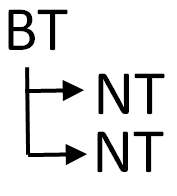...
| Relationship | Description |
|---|---|
Hierarchical | Hierarchical relationships are used to define broader and narrower scopes between tags. A broader tag is a wider generalization of a narrower tag, for example "vehicle" can be used to describe a "truck", "car", "motorcycle" and "bicycle". In this example, "vehicle" is the broader tag and "truck", "car", "motorcycle" and "bicycle" are narrow tags for "vehicle". Likewise, "compact", "sub-compact" and "sedan" are narrower tags for the broader tag "car". A broader/narrower tag relationship can also be referred to as a parent/child relationship. Child tags sharing the same parent are referred to as siblings. In XperienCentral, when you define a tag as being a broader or narrow tag for another, the reciprocal relationship is automatically created. For example if you assign "vehicle" as the broader tag for "car", "car" is automatically assigned as a narrower tag for "vehicle". In thesaurus nomenclature, broader tags are abbreviated as "BT" and narrower tags are abbreviated as "NT", for example: |
| Equivalency | Equivalency relationships are used primarily to tie synonyms and near-synonyms together. Oftentimes the equivalency relationship acts as a bridge or tie between an official or preferred tag and one or more unofficial or casual versions. For example the "United States of America" is the official name of the country but it is also commonly referred to as "The US" and "America". In XperienCentral's thesaurus nomenclature, equivalency relationships are tied together using "Use for" (U) and "Is used for" (UF) indicators. "Use for" and "Is used for" tags always have a reciprocal relationship. For example, for example if "The United of America" has an "Is used for" relationship with "America" then "America" automatically has a "Use for" relationship with "The United States of America". |
| Associative | Associative relationships are used in cases where the relationship between the tags is neither of the above types. For example, "Information technology" is related to "computers" in the sense that information technology is managed and made possible by computers but the relationship is neither hierarchical nor equivalent. In XperienCentral's thesaurus nomenclature, associative relationships are referred to using the "related to" (RT) indicator. |
...
